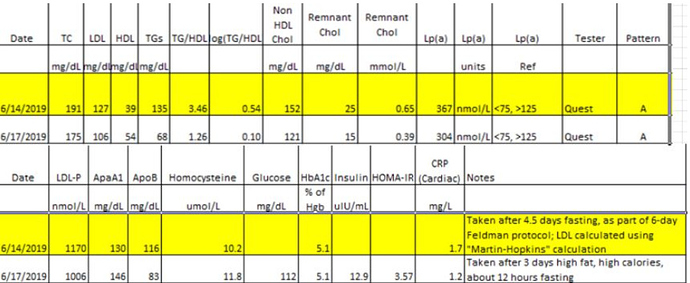Here is an excerpt from a KetoWoman/Dr. Boz Podcast:
Jojo has a question. She would like your thoughts on her recent overall cholesterol being so high at 357. What other tests should she get done? This is her first blood work since starting keto in July. She knows it’s common for this to happen, ie the cholesterol going up, but the more advice she can get, the better.
Right? So why has cholesterol become this marker of worry for the world? And it is because it was linked to heart disease, except they didn’t do such a great job when they first discovered this at linking the two in a correct manner. What I first and foremost remind patients is, cholesterol is the carrier. This is what carries fat from one section to the next. When I put you on a diet that’s 85% fat, guess what? The carrier is going to get higher. The cholesterol is going to get higher. It is not the predictor of heart attacks. You can better predict a heart attack with the size of your waistline. If you put weight on in your tummy, that’s a better predictor of a heart attack than your cholesterol was. So that’s easy. You can do that one at home. Your morning fasting blood sugars, those are a better marker of a heart attack than cholesterol.
Other tests from your doctor? I would encourage every single person who wants to know if they have a risk of a heart attack to look at a calcium score. This is a very high speed, MRI that takes pictures of the coronary arteries. If you have a zero on your calcium score, it is a protector for the next 15 years that you will not have a heart attack. Way better than I can do with that cholesterol, which is going to change depending on what your diet has been for the better part of the previous six weeks before I checked the blood. When I look at a calcium score and it’s zero, I can have a lot of confidence that the inflammation going on in their body is still very low and not depositing calcium into those coronary arteries.
Other markers that are somewhere in between are a Highly Sensitive C Reactive Protein. I say that very specifically a Highly Sensitive C Reactive Protein. This is a marker of inflammation that is designed to specifically predict what the inside skin layer of blood vessels is. In America there’s this cartoon that would happen after school called The Magic School Bus and this teacher would teach you about science and things with the magic school bus. Her magic school bus could get really tiny and she’d drive down the arteries of a human body and teach about anatomy. So if you were driving down the artery and you looked around the skin layer that lines the tunnel, the Highly Sensitive C Reactive Protein helps me know is that inflamed? And that is a predictor of a heart attack. You’re starting to put cholesterol deposits in that layer. Guess what? It’s very inflamed and it’s going to do that even before your blood sugar is high. Before you have a change in your Hemoglobin A1C, which is a predictor of diabetes.
If I needed to know if you are going to have a heart attack and I needed to be the most confident, if I got to grab which one I would look at first, it would be a calcium score in your coronary arteries and I’d vote for a zero. If I don’t get to do that. You don’t need a doctor’s prescription to do that. If you look at any - in America anyway - if you look at any place in America, you can just call up the cardiology team and I think it’s like $25. It’s really cheap. So it’s a quick MRI. It’s a screen for calcium. And if your score is zero, congratulations. If it’s like 250, we’re talking about some significant risks. I have a patient over the last six months who it was like 2,500. So you talk about the question we started this with where they have heart failure, and boy that calcium score is…that’s a delicate equation. We need them carefully monitored by a physician as they make some changes. But instead of focusing on the cholesterol, I would look at those markers instead. …” Ask Dr. Boz Part 2



